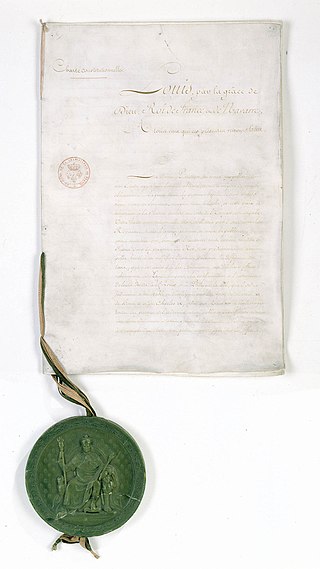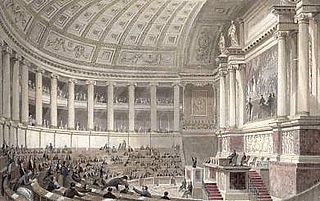| | ||||||||||||||||
| ||||||||||||||||
All 400 seats in the Chamber of Deputies 201 seats needed for a majority | ||||||||||||||||
|---|---|---|---|---|---|---|---|---|---|---|---|---|---|---|---|---|
| ||||||||||||||||
| ||||||||||||||||
Legislative elections were held in France on 18 and 28 August 1815 to elect members of the first Chamber of Deputies of the Bourbon Restoration.
| | ||||||||||||||||
| ||||||||||||||||
All 400 seats in the Chamber of Deputies 201 seats needed for a majority | ||||||||||||||||
|---|---|---|---|---|---|---|---|---|---|---|---|---|---|---|---|---|
| ||||||||||||||||
| ||||||||||||||||
Legislative elections were held in France on 18 and 28 August 1815 to elect members of the first Chamber of Deputies of the Bourbon Restoration.
Electoral colleges elected a number of candidates equal to the number of deputies. Electoral colleges of the departments chose half of the deputies from these candidates and the other half were chosen freely.
The Ultra-royalists won 350 seats. [1] The parliament later became known as the Chambre introuvable .
 | ||||
|---|---|---|---|---|
| Party | Votes | % | Seats | |
| Ultra-royalist | 350 | |||
| Opposition | 50 | |||
| Total | 400 | |||
| Total votes | 40,000 | – | ||
| Source: Election-Politique, Roi et President | ||||

The Twelfth Amendment to the United States Constitution provides the procedure for electing the president and vice president. It replaced the procedure in Article II, Section 1, Clause 3, under which the Electoral College originally functioned. The amendment was proposed by Congress on December 9, 1803, and was ratified by the requisite three-fourths of state legislatures on June 15, 1804. The new rules took effect for the 1804 presidential election and have governed all subsequent presidential elections.

Presidential elections were held in the United States from November 4 to December 7, 1796, when electors throughout the United States cast their ballots. It was the first contested American presidential election, the first presidential election in which political parties played a dominant role, and the only presidential election in which a president and vice president were elected from opposing tickets. Incumbent vice president John Adams of the Federalist Party defeated former secretary of state Thomas Jefferson of the Democratic-Republican Party.

The Second Bourbon Restoration was the period of French history during which the House of Bourbon returned to power after the fall of Napoleon in 1815. The Second Bourbon Restoration lasted until the July Revolution of 26 July 1830. Louis XVIII and Charles X, brothers of the executed King Louis XVI, successively mounted the throne and instituted a conservative government intended to restore the proprieties, if not all the institutions, of the Ancien régime. Exiled supporters of the monarchy returned to France but were unable to reverse most of the changes made by the French Revolution. Exhausted by the Napoleonic Wars, the nation experienced a period of internal and external peace, stable economic prosperity and the preliminaries of industrialization.
An electoral college is a body whose task is to elect a candidate to a particular office. It is mostly used in the political context for a constitutional body that appoints the head of state or government, and sometimes the upper parliamentary chamber, in a democracy. Its members, called electors, are either elected by the people for this purpose or by certain subregional entities or social organizations.

The National Assembly is the lower house of the bicameral French Parliament under the Fifth Republic, the upper house being the Senate. The National Assembly's legislators are known as députés, meaning "delegate" or "envoy" in English; etymologically, it is a cognate of the English word deputy, the standard term for legislators in many parliamentary systems.
The Ultra-royalists were a French political faction from 1815 to 1830 under the Bourbon Restoration. An Ultra was usually a member of the nobility of high society who strongly supported Roman Catholicism as the state and only legal religion of France, the Bourbon monarchy, traditional hierarchy between classes and census suffrage, while rejecting the political philosophy of popular will and the interests of the bourgeoisie along with their liberal and democratic tendencies.

The States of Guernsey, officially the States of Deliberation and sometimes referred to as the Government of Guernsey, is the parliament and government of the British Crown dependency of Guernsey. Some laws and ordinances approved by the States of Guernsey also apply to Alderney and Sark as "Bailiwick-wide legislation" with the consent of the governments of those islands. All enactments of the States of Guernsey apply to Herm as well as Guernsey, since Herm is directly administered by the Bailiwick of Guernsey.

The National Assembly is the unicameral legislative house of the Parliament of Mauritania. The legislature currently has 176 deputies, elected for five-year terms in electoral districts or nationwide proportional lists.

The Duchy of Nassau was an independent state between 1806 and 1866, located in what became the German states of Rhineland-Palatinate and Hesse. It was a member of the Confederation of the Rhine and later of the German Confederation. Its ruling dynasty, later extinct, was the House of Nassau. The duchy was named for its historical core city, Nassau, although Wiesbaden rather than Nassau was its capital. In 1865, the Duchy of Nassau had 465,636 inhabitants. After being occupied and annexed into the Kingdom of Prussia in 1866 following the Austro-Prussian War, it was incorporated into the Province of Hesse-Nassau. The area is a geographical and historical region, Nassau, and Nassau is also the name of the Nassau Nature Park within the borders of the former duchy.

The French Charter of 1814 was a constitutional text granted by King Louis XVIII of France shortly after the Bourbon Restoration, in form of royal charter. The Congress of Vienna demanded that Louis bring in a constitution of some form before he was restored. After refusing the proposed constitution, the Constitution sénatoriale, set forth on 6 April 1814 by the provisional government and the Sénat conservateur, Louis Stanislas Xavier, count of Provence, bestowed a different constitutional Charter, on 4 June 1814. With the Congress of Vienna's demands met, the count of Provence was officially named Louis XVIII, and the monarchy was restored.

The Chamber of Deputies was the lower house of Parliament in France at various times in the 19th and 20th centuries:
Legislative elections were held in France at the end of August and in September 1792 to elect deputies to the National Convention. Primary elections to elect members of electoral colleges were held in August, with the electoral colleges subsequently voting from 2 to 19 September. The elections established the nation's first government without the monarch, Louis XVI. On 20 September the Convention gathered for the first time.

Municipal elections in France allow the people to elect members of the City Council in each commune. These are called conseillers municipaux. They elect the mayor, who chairs the city council, as well as Deputies to the Mayor. The term of office of councilors, the mayor and his deputies is, in principle, six years.

Senators in France are elected by indirect universal suffrage, by a panel of "electors". Half of the Senate seats are up for election every three years; the term of office is six years.

Parliamentary elections were held in Haiti on 9 August 2015, with a second round initially planned for 25 October. Two-thirds of the Senate and all members of the Chamber of Deputies were up for election. International observers reported that early rounds of voting have experienced significant fraud, including people voting more than once due to failure of indelible ink, vote buying due to lack of secrecy, poor training of election workers, poor tracking of political parties, and other problems. This has resulted in the nullification of some results and rescheduling of re-runs. The second round of the parliamentary elections that had been scheduled for October 2015 was postponed to October 2016, along with the first round for a third of the Senate and the first round of a new presidential election.

Senatorial elections were held on 24 September 2017 to renew 170 of 348 seats in the Senate of the French Fifth Republic.
Legislative elections were held in France between 8 and 22 May 1815 for the period of the Hundred Days. The elections were held to appoint deputies to the Chamber of Representatives established by the Additional Charter of 22 April 1815. The elections were the first since April 1799 and last of the 'republican system' until the Charter of 1830.
Legislative elections were held in France between 9 and 16 April 1799 to elect one-third of the members of the Council of Five Hundred and the Council of Ancients, the lower and upper houses of the legislature.
The Liberals was a short lived French liberal political party which was active in several elections before being absorbed into the Doctrinaires, a fellow constitutional monarchy party. Several members of the Liberals eventually went on to serve in the Movement Party and even later in the Orléanist parties. The precedent set by the party would help form modern French classical liberalism, something used in the modern centre-right Republicans party.